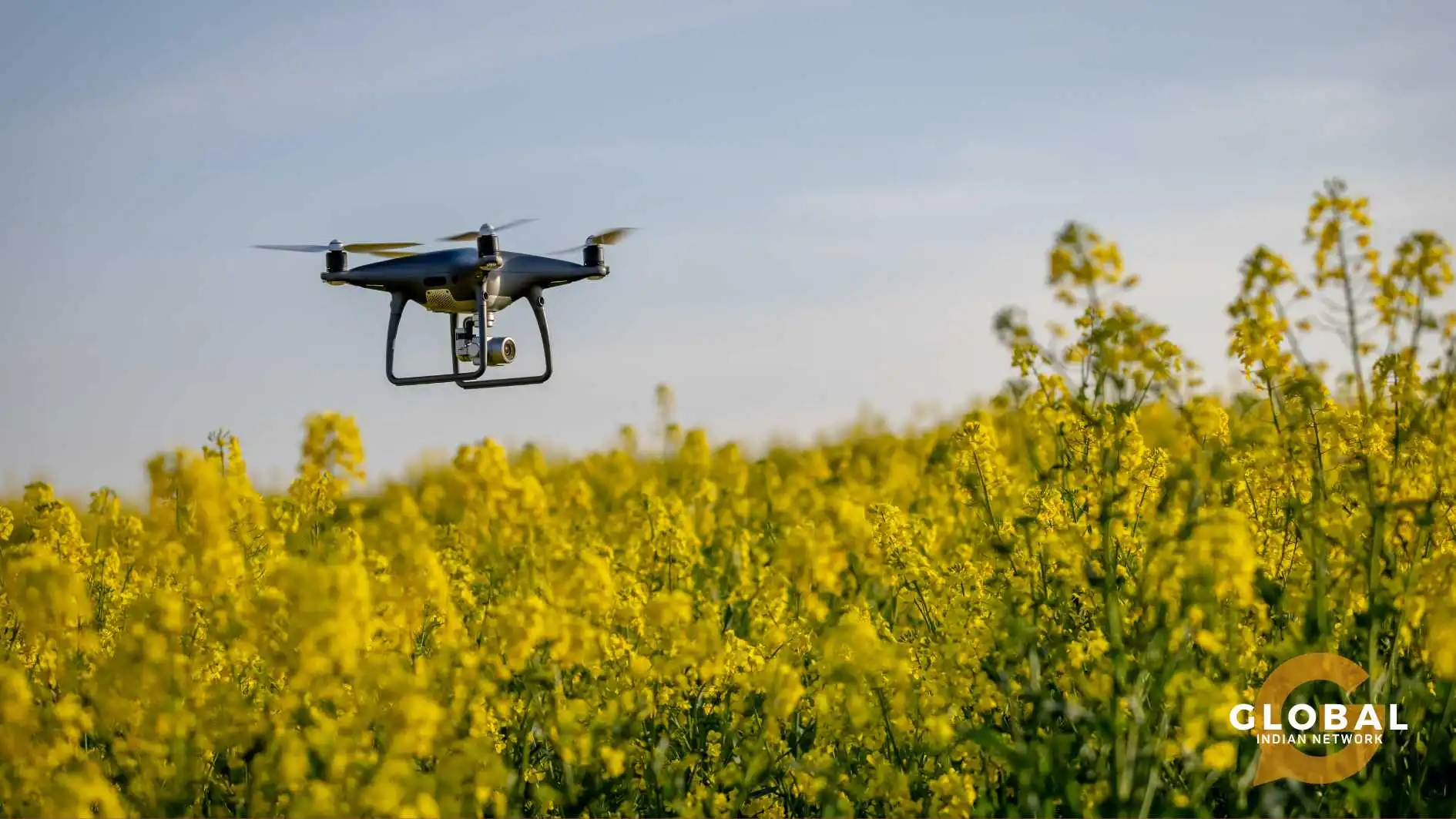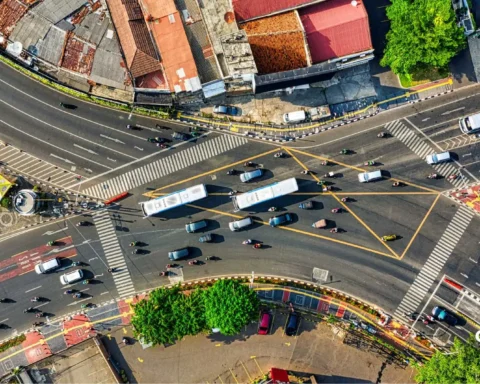Golden rice fields and lush pepper plantations meet cutting-edge technology as two ancient civilizations come together—India and Cambodia. In these vibrant lands, tradition and innovation increasingly walk hand in hand. Imagine drones buzzing over Mekong farmlands, smart sensors guiding tillers in the Punjab, and youth-led startups weaving digital magic into centuries-old agricultural routines. This is not a distant vision but the growing reality of Indo-Cambodian partnerships in agri-tech and food processing—a dynamic exchange planting the seeds for food security and rural prosperity.
With India’s thriving tech ecosystem intersecting Cambodia’s rich farmlands and burgeoning markets, both nations are scripting an extraordinary story: one where the wisdom of the past meets tomorrow’s tools, and where climate challenges are tackled together. As collaborations blossom—from mobile-based farmer advisories to high-value food exports—these cross-border connections promise not only richer harvests but also a sustainable, shared future for two nations on the rise.
The dynamic relationship between India and Cambodia is entering an era marked by shared ambition in agri-tech innovation and food processing. As global market uncertainties, climate change, and population growth pressure food systems, both countries are leveraging their comparative strengths to drive mutual progress, empower agricultural communities, and foster sustainable economic growth.
Table of Contents
Shared Strengths and Complementary Needs
India, with its robust ecosystem of agri-tech startups, world-class research institutions, and a growing food processing industry, offers Cambodia expertise in advanced technologies, capacity building, and value addition. Cambodia, with its fertile lands and rich production of crops like rice, cassava, pepper, cashews, and tropical fruits, provides new opportunities for Indian investors and technology providers, especially in post-harvest management and processing.
While Cambodia has traditionally exported raw agricultural products, a pronounced policy pivot is now underway toward higher-value processing. This shift aims to ensure that more of the agricultural value chain—and its economic benefits—remain within Cambodian borders. Conversely, India seeks to secure sustainable, diverse sourcing and collaborate on innovation to boost rural livelihoods and food security.
Key Areas of Partnership
Technology Transfer and Startup Innovation
- Indian agri-tech companies, such as CropIn, are actively partnering with Cambodian stakeholders to introduce precision farming, remote sensing, and digital advisory solutions.
- Cambodian innovators are rapidly adapting these tools. The widespread adoption of smartphones, GPS mapping, drones, and irrigation automation is driving productivity gains, particularly among youth-led startups and cooperatives.
- Impact Hub Phnom Penh and other entrepreneurship incubators have launched accelerator programs for agri-tech, involving Indian technology and mentorship, to strengthen business models and product-market fit for Cambodian startups.
Modernizing Food Processing
- Cambodia’s food processing landscape is now in transformation, catalyzed by a young, urbanizing population demanding convenience foods and shelf-stable products.
- Indian investors and technical experts are aiding Cambodia in setting up facilities for processing rice, cassava, palm sugar, cashews, and tropical fruits. These partnerships supply both domestic and Indian retail markets, elevating Cambodian agricultural exports from bulk commodities to branded, consumer-ready products.
- Ongoing government support on both sides includes capacity-building projects, favorable investment laws in Cambodia, and credit facilitation from India to support plant establishment and R&D.
Dairy, Fisheries, and Sustainable Livelihoods
- India’s time-tested dairy cooperative model, personified by Amul, presents Cambodian agribusinesses with a blueprint for increasing farmer incomes and fostering rural resilience. Joint ventures in dairy and freshwater fisheries can create new jobs, raise nutrition standards, and reduce reliance on seasonal wild catches—fueling both public health and profitability.
- New research and training programs funded via the Indian Technical & Economic Cooperation (ITEC) Programme and Quick Impact Projects have trained thousands of Cambodian professionals in agricultural technology, food processing, and supply chain management.
Digital Agriculture, FinTech, and Supply Chain Transparency
- Blockchain-based projects like BlocRice are improving transparency for exporters and guaranteeing traceable, fair-trade rice for global buyers—a model where Indian fintech and traceability expertise are highly relevant.
- Mobile finance and digital payments, technologies pioneered at scale in India, are empowering Cambodian farmers with new channels for credit, insurance, and marketing.
Success Stories and Flagship Projects
- Recent Indo-Cambodian business delegations and trade exhibitions have led to new investments in packaging, cold storage, logistics, and food safety—all areas where Indian best practices and equipment are in demand.
- Joint ventures have begun to explore food innovation—such as the introduction of high-value crop varieties, food fortification, and bio-based packaging—underscoring that innovation is flowing in both directions.
Quantitative Insights
Market Size & Trade Value
India-Cambodia total trade in 2024 was about USD 404 million, with agri/food products being essential but not the top trade item. Cambodia’s rice exports in 2024 approached USD 2 billion, and the broader agricultural export portfolio is significant but did not reach USD 4 billion. India’s food processing sector is poised for strong growth, reaching upwards of USD 535–700 billion by 2029–30. Cambodia’s processed food exports, especially rice and related items, have grown steadily, though not all growth is linked to Indian investment or technical input.
Sector Investments
Cambodia attracted USD 4.9 billion in FDI in 2024, with 10-12% going to agriculture and agri-processing sectors. Indian firms have invested over 120 million in industries such as rice milling, cassava processing, and food packaging over the past five years. Since 2021, five Indo-Cambodian JV food processing facilities have been established with annual production capacities of 10,000-50,000 tonnes.
Technology & Startup Metrics
Cambodian pilot regions have seen a 15-20% increase in rice yields and a drop in input costs using Indian precision farming tools. Around 30 agri-tech startups have emerged in the last three years, with at least five receiving Indian mentoring or seed funding. With mobile penetration over 125%, app-based advisories can benefit farmers.

Employment & Skills Development
Since 2018, Indian programs have trained over 3,000 Cambodian agricultural professionals, with each new medium-scale food processing plant supporting 150-250 direct jobs and up to 1,000 indirect jobs. Indo-Cambodian accelerators support Cambodian youth-led agri-businesses, resulting in 20-30% annual revenue growth.
Sustainability & Climate Resilience Metrics
Indian-led climate-smart rice trials in Cambodia show 30% greater drought tolerance compared to traditional varieties. Switching to mechanized, precision planting (via Indo-Cambodian collaborations) has reduced water usage on pilot farms by 12–15%.
Case Studies
Indian Agri-Tech Presence in Southeast Asia
India’s agritech sector is expanding beyond domestic markets, with 25+ startups participating in projects across Southeast Asia, including Cambodia, Vietnam, and Indonesia. In Cambodia, five Indian technology partnerships digitize farm management, enhance traceability, and offer advisory services. A 2023 precision farming pilot in Battambang, using Indian IoT sensors, led to 20% higher rice yields and 8-10% lower water and fertilizer usage.
BlocRice Blockchain Project: The BlocRice blockchain project, backed by Indian fintech and traceability tech, has enabled Cambodian rice farmers to secure 12-15% higher contract prices by providing verified supply chain data to European and Japanese exporters, thereby increasing their export contract prices by up to 15%.
Indian Cassava Processing JV in Kampong Thom: An Indo-Cambodian cassava starch processing plant, operational since 2021, has doubled the incomes of over 4,000 smallholder farmers by processing 150,000 tonnes of raw cassava annually, resulting in an increase in export revenues from USD 4 million in 2022 to USD 6.5 million in 2024.
Indian Dairy Cooperative Model Pilot: India’s ITEC program supported a dairy pilot in Takeo Province in 2023, boosting milk yields from 6 to 8 liters per cow/day and connecting 500+ households to a steady market, resulting in a 25% increase in cooperative revenues.
Mobile Payment System: In Cambodia’s Prey Veng province, mobile payment adoption—especially via the Bakong system—has improved financial access for farmers. While exact figures for remittance cost reductions aren’t confirmed, digital transactions have surged nationally, with over 19 million e-wallet users and faster payments enhancing inclusion and reducing delays across rural communities.
Challenges
These burgeoning partnerships face several challenges: mobilizing finance for rural micro, small, and medium enterprises (MSMEs); bridging skills gaps; improving infrastructure; and aligning food safety standards to global markets. Yet, these very obstacles have catalyzed new areas of exchange—skills training, certification, and investment in logistics and cold chains.
Crucially, both governments view these initiatives as central to national development. India’s states, such as Uttar Pradesh, are actively building direct links with Cambodian suppliers and processors—expanding the partnership from national to state and enterprise levels.
Sector-Specific Business Opportunities
For Indian SMEs
Indian SMEs can export affordable, smallholder-friendly equipment to Cambodia through the use of irrigation automation, drones, and low-cost mechanization tools. They can also provide food processing technology and plant setup services, partnering with Cambodian cooperatives or processors to reduce supply costs and boost export shelf life. Indian agribusiness consultants can help Cambodian enterprises meet global food safety standards, making them eligible for premium export markets in the EU, US, and Japan. Additionally, biofertilizers, hybrid seeds, and organic crop-protection solutions from India can find a market in Cambodia.
For Cambodian Youth Entrepreneurs
Cambodia’s young tech-savvy entrepreneurs can leverage India’s expertise and funding to develop agri-tech startups, value-added food businesses, e-commerce and digital trade platforms, and creative food branding. They can create mobile platforms for farm advisory services, weather alerts, crop disease detection, and marketplace linkages, all targeting rural farmers. They can also create consumer-facing brands using Indian packaging technology and marketing know-how, open up direct-to-consumer exports, and co-brand premium crops for niche gourmet markets.
For Indian Large Enterprises & Investors
Investment in Cambodian agro-industrial parks provides tax incentives, low-cost labor, and a strategic ASEAN market gateway. Large Indian food retail chains can diversify sourcing portfolios with Cambodian products.
For Cambodian Cooperatives & Farmer Groups
Cambodian cooperatives and farmer groups can benefit from Indian digital agri platforms and participatory seed development, which can enhance farm-level digitization, boost yields, and enable local adaptation of climate-smart crops.

Actionable Takeaways for Stakeholders
For Indian SMEs and Startups
Cambodian farmers can access supply chains and market insights through local partnerships, while assembly plants in agro-industrial parks can reduce import costs. Government programs like ITEC and Cambodian investment laws can provide concessional financing and R&D grants.
For Cambodian Entrepreneurs
Cambodian entrepreneurs should focus on building brand value by creating premium products targeting India’s gourmet and health-conscious consumer segments, adopting Indian tech blueprints like AI-based crop advisory and dairy cooperative systems, and partnering with Indian e-commerce exporters to secure digital market access.
For Large Corporates and Investors
Large corporations and investors should invest in Cambodia‘s perishable crop losses for profitable cold storage, logistics, and processing units. Target high-volume crops like rice and cassava, form joint ventures in special economic zones with tax holidays and ASEAN cross-border trade, and develop signature export lines for India’s food basket.
For Policymakers & Trade Bodies
Cambodia could standardize food safety and quality standards with India’s FSSAI, streamline customs processes, and launch Indo-Cambodia Agri-Tech Forums to boost cross-border exports, streamline customs procedures, and facilitate matchmaking between investors, startups, and producers.
Implementation Tips
Implementation tips include piloting before scaling, partnering with Cambodian youth for skills programs, and utilizing joint risk-sharing agreements and crop insurance to manage uncertainties in climate and production.
Business Opportunity Focus
Here’s a detailed section that speaks directly to investors, SMEs, and entrepreneurs:
Top Five Business Growth Areas in Indo–Cambodian Agri-Tech & Food Processing
The evolving partnership between India and Cambodia is not just a diplomatic win—it’s a commercial goldmine for forward-thinking businesses. Here are the five sectors with the most substantial growth potential for the next decade:
High-Value Crop Processing
Cambodia’s premium crops, including Kampot pepper, aromatic rice, organic cashews, mangoes, and palm sugar, are gaining global attention. By investing in processing units, Indian and Cambodian firms can increase value, reduce commodity price volatility, and target high-margin gourmet and health-food segments in India, ASEAN, and the Middle East.
Cold-Chain Logistics and Storage Solutions
India’s experience in cost-effective cold-chain systems can help Cambodia reduce post-harvest losses by 20-30%. Joint ventures can expand chilled warehouses, reefer trucks, and packhouses, supporting perishable commodity exports to India’s retail sector and ensuring year-round supply stability. Indian logistics companies can create end-to-end supply chains.
Digital Agriculture & Agri-FinTech Solutions
Cambodian farmers are embracing digital advisory platforms, AI-based pest detection, weather forecasting apps, and digital marketplaces due to mobile penetration above 125%. Indian agri-tech firms like CropIn, DeHaat, and Gramophone can localize these models for Cambodia’s needs. Cambodian youth entrepreneurs can co-develop apps for Khmer language support, local cropping patterns, and ASEAN trade integration.
Food Safety & Quality-Certified Exports
Global buyers demand traceability, quality certifications, and compliance with food safety standards. Indian consultancies, labs, and certification agencies can partner with Cambodian producers to expedite compliance, opening high-margin exports to Europe, Japan, the US, and premium retail chains in India.
Indian consultancies, labs, and certification agencies can help Cambodian producers achieve global food safety standards like HACCP, ISO 22000, and FSSC 22000. This ensures traceability and quality compliance, enabling premium exports to Europe, Japan, the US, and India’s retail chains, boosting market access and competitiveness for Cambodian agri-food businesses.
Sustainable & Eco-Friendly Packaging
Demand for eco-friendly packaging solutions is increasing globally. Cambodia’s natural fibers and advanced green packaging technology can help create export-ready lines that reduce environmental impact and differentiate brands. Indo-Cambodian startups can supply sustainable packaging to local processors, Indian exporters, and regional food brands in ASEAN.

Conclusion: The Promise of a Shared Harvest
As the sun sets over Cambodia’s emerald paddies and dawn breaks in India’s fertile plains, a new era of agricultural ambition glimmers on the horizon. Indo-Cambodian partnerships in agri-tech and food processing are no longer just trade agreements or diplomatic gestures—they are bridges of innovation connecting hearts, harvests, and hope. Imagine a future where climate-smart rice developed in India lifts yields in Cambodian villages, or where a Cambodian startup’s packaging breakthrough shines on Indian supermarket shelves. The seeds of collaboration, already sprouting with promise, offer more than just profits—they offer resilience and shared nourishment in a rapidly changing world.
As these two ancient civilizations merge ancestral wisdom with tomorrow’s tech, their story becomes an inspiring blueprint for global agricultural transformation—all share one where progress knows no borders and the bounty.
The question now is not if, but how far these nations’ seeds of alliance will grow.









